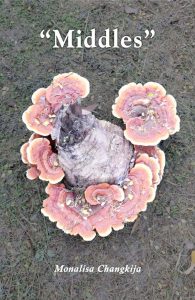Book Reviews
“Middles” – Pickings from the Everyday Life of Naga Society

An honest assessment of the times, even for the casual observer, reveals that we, as a society, have become people who cannot seem to stomach truthful observations. Whether this may be underpinned to being beleaguered by the sentinels who prescribe nationalist aspirations, the desire to homogenize the complications of diversity and democracy, or to construct an image of power; all these are primarily shaped by narratives that aim, directly or otherwise, to restrict or altogether censor individual agency. The world we live in today seemingly has an eroded capacity for what one believes to be one’s truth if at all it contravenes the various levels of conformity that it renegades against or subverts. In abstract, the ‘truth’ can be defined as a signpost of belief upon which an individual places one’s foundations of life itself as it is practiced. Having said this, the ‘truth’ is also subjective, with troubled objectivity or the paradox of factual correctness that is not absolute, and the very quality that we often ascribe as ‘truth’ is projected in different ways by different individuals. What struck me as I began reading Monalisa Changkija’s “Middles” was her witty inquiry of what we assume to be the truth. For me, this method of inquiry is immensely refreshing – especially when we live in a society where facades and obligatory rituals take precedence over honesty. The author skilfully presents her inquiries in the method of the interstices – the middle so to speak – and we are privy to essays that are witty, crisp and with their respective punchlines that inevitably engages the reader beyond the textual moment.
Even though I am far from the trained critical eye, nor an expert commentator, but I would describe myself as someone who tries to remain a keen observer of the everyday qualities of our lives, at the very least. So, I hope you will allow me these observations now even as I am drawn to literary works of writers who portray alternate narratives of ‘everydayness’ or the ordinary, and thus take the act of writing and its artistic implications in refreshing directions through their writings. Therefore, it is on this single aspect of “Middles” that I wish to briefly present some of my thoughts.
First and foremost, as you may be aware, this book presents a collection of non-fictional essays in the tradition of writing Middles in journalism. Needless to say, each of the chapters address a variety of issues prevalent in our society – issues ranging from the veil of politeness that mask xenophobic attitudes; the dilemma of the gap between dates of birth and birth certificates; the unreasonable demand for government jobs privileged over the private sector employment which is often ironically categorized as ‘unemployed’ in mechanisms of state statistics thereby disqualifying the merit of all forms of labour and the associated dignity; the pandemic of maintaining appearances sometimes at great individual and economic cost; the incommodious notion of communal obligations, and the fate of formal education in Nagaland as well the author’s perspectives on personal matters. Throughout each of these essays, there appear at times unusual yet intriguing narratives, and the author foregrounds her writing with her own truth – a truth that would be indigestible for many in our society. To give an example, I quote from the book:
But you see that’s the problem ~ we do not look beyond the surface and beyond the facades we have learnt to put on. At the same time, we have also mistaken our true selves to be the surface and the facades we put on… See, the microbes of this disease are cultured in the cesspool of assumptions and presumptions ~ obviously based on the cursory, the inconsequential and the surface ~ therefore we build indestructible walls and unbridgeable chasms amongst us. (26 – 27)
This is an observation that many conscientious individuals in our society would agree with – in reality, there are reprehensible characteristics amongst Nagas today. The fear of the unknown, the preservation of facades even to the detriment of the social fabric, and the upholding of unintelligible presumptions – if one is to trace the genealogy of these unsocial characteristics, we may unwittingly discover, as I have, that these traits are in fact rooted in our everyday lives – where a conditioning is taking place in a very matter of fact, ordinary and acceptable ways. Hypocrisy is afforded a complacent yet dangerous status. Thus, we forget to question, or even feel a sense of discomfort with what is presented to us as a ‘way of life’ or ‘normal’ but remain uncommitted to see things change. Inevitably, this begs the question – should we challenge the foundations of what we consider to be the truths of our society? Personally for me, a method in which one can commence upon such a challenge is through a cognition of everyday life, conversations, assumptions and presumptions about the norm and the accepted. It is this very quality that encompasses the writings of Ma’am Monalisa Changkija’s “Middles”. The book addresses everyday life in the Naga society, not as a vitriolic criticism as many would assume would be the case when critical observations are made about our own society; but, as a witty and refined approach to an interpretation of social ambivalences. Inadvertently, the humour and the subtle nudge of the closing statements in each essay push the reader to a discomfort – a discomfort that requires attention even as it is cajoling rather than polemically censuring. This attention would require one to question – a process that we are fast becoming unfamiliar with. “Middles”, is for me, an unashamed and honest narrative about the veils that mask our everyday lives, thus obscuring or glossing over the need to reflect on these issues.
Dr S Elika Assumi
Assistant Professor,
Department of English
ICFAI University Nagaland, Dimapur

